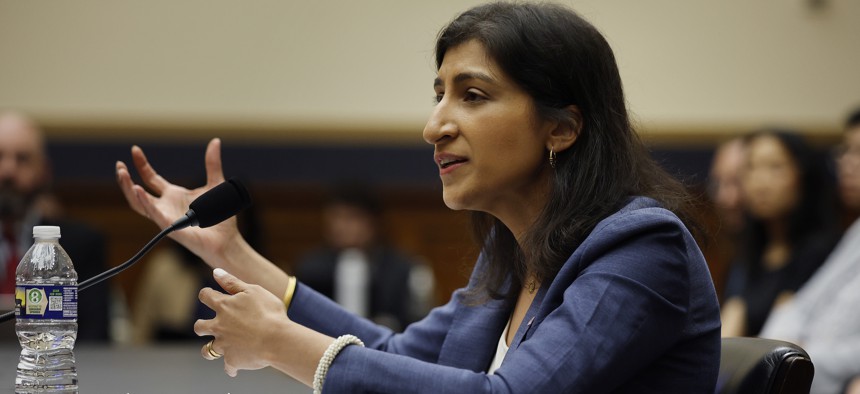FTC to probe big tech firms on AI deals

FTC Chair Lina Khan, shown here testifying before a House committee in July 2023, is looking into anti-competitive practices among big tech companies using AI. Chip Somodevilla/Getty Images
The Federal Trade Commission is looking deeper into major technology companies’ investments and partnerships with fellow artificial intelligence and cloud service providers.
The Federal Trade Commission announced its new investigation into five big tech companies regarding their partnerships with both generative artificial intelligence and cloud service providers.
Companies Alphabet, Amazon.com, Anthropic, Microsoft, and OpenAI will all be subject to the FTC’s inquiry. Investigators will focus on understanding how any recent investments in AI and cloud companies may impact the competitive landscape in the tech industry.
“Over the last 18 months, the rapid deployment of artificial intelligence tools have captured the world's attention, spurring some combination of all wonder, apprehension and fear,” said FTC Chair Lina Khan during a meeting on Thursday. “More fundamentally, we face basic questions of power and governance. Will this be a moment of opening up markets to fair and free competition, unleashing the full potential of emerging technologies, or will a handful of dominant firms concentrate control over these key tools, locking us into a future of their choosing?”
Specific information the FTC is looking for includes if new business partnerships and mergers violate the law or impede in competitive practice, regular internal meeting subject matters, expansion into other geographical markets, competition for AI inputs and resources, and foreign entity connections.
These could take the form of documentation analyses, and reports dating from Jan. 1, 2022 to present day.
Data protection is another aspect of the FTC’s inquiry. Khan said that agency officials recognize privacy violations are intimately tied to a firm’s ability to corner the market in AI or cloud computing software.
A potential enforcement action the FTC could take against AI developers include ordering the destruction of AI models trained on unlawfully collected data.
“The drive to refine your algorithm cannot come at the expense of people's privacy or security, and privileged access to customers’ data cannot be used to undermine competition,” Khan said.
The FTC has lately cracked down on businesses’ usage of AI, machine learning and unlawfully collected data. Most recently, the agency banned pharmacy chain Rite Aid from leveraging biometric facial recognition technology following reports of erroneous theft accusations based on video surveillance tech.
“As we continue to establish rules of the road for AI, it's also essential that we set clear boundaries on the content that can and cannot be used for scraping and model training,” Khan said.






